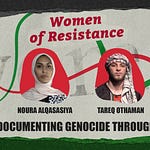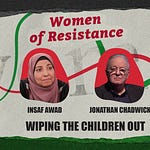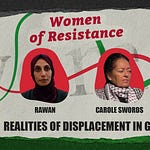“Without realising it, we’ve all become fighters.”
In this eighth episode of Women of Resistance, host Sakina Datoo introduces us to Feda Al-Hasanat, a young artist from Gaza who has lived through mass displacement, loss, and war—but who continues to fight back with her paintbrush.
Feda’s story is one of identity reclaimed and memory preserved. Her father spent 14 years in exile, separated from the family by the bureaucracy of occupation. Her uncle was imprisoned for resisting the Israeli army—a fact she once felt ashamed of, until her mother taught her that “not all prisoners are criminals; some are heroes.”
“They want to erase us,” Feda says. “But through our art, our stories, our memories—we resist.”
Her paintings, filled with sorrow and symbolism, chronicle the siege. Since October 7, Feda has lived through airstrikes, displacement, and homelessness. Her home became a shelter for extended family. The nights were marked by the screams of martyrs; the days by uncertainty and survival.
“I think of the girls in tents,” she reflects. “No privacy, no safety—not even a toilet. That’s what war steals.”
And yet, in her words and her work, Feda fights back. Through teaching children, sketching in the dark, and documenting daily life, she defies the occupation’s attempts to silence and erase.
Joining Sakina in studio is Amina-Karine Kermous—a wellness coach and mother of five—who speaks to the emotional toll on women and mothers.
“These women are diamonds,” Amina-Karine says. “They’ve been formed under pressure—and they still shine.”
The conversation turns to how the genocide has been live-streamed, witnessed, and ignored.
“The victims were the wrong colour,” Amina-Karine notes. “That’s why the world looked away.”
But Feda refuses to be invisible.
“We all became fighters,” she says, “even if we didn’t realise it.”
Her art isn’t just personal—it’s national. It’s testimony. It’s survival.
“Tomorrow,” she says, “I want to show the world what they did to us.”
And she will—one painting at a time.









